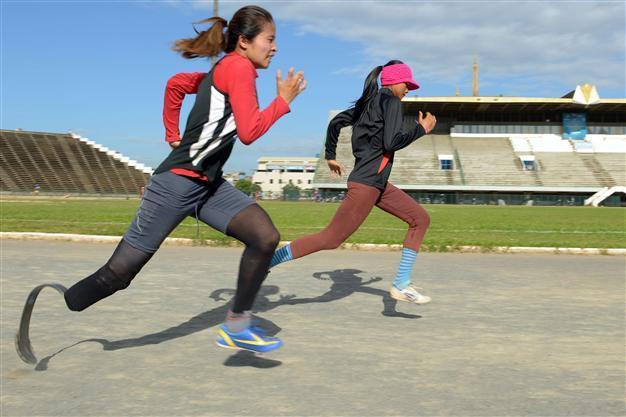Cambodia bemoans ‘high-tech Games’
PHNOM PENH - Agence France-Presse

This photo shows Thin Seng Hon (L) running during a training session at the Olympic Stadium in Phnom Penh. Cambodia is sending just one athlete to the Paralympics. AFP photo
It has the world’s highest percentage of amputees yet Cambodia is sending just one athlete to the Paralympics, an event critics say increasingly favors nations that can afford the latest high tech gear.Thin Seng Hon, who was born without a fully formed right leg, will be Cambodia’s sole representative in London when she competes in the 100m and 200m sprints in the below-the-knee amputee category.
Her “lucky leg,” as she calls the $2,500 J-shaped running blade which allows her to race, helped her to three podium places at a regional athletics meet last year.
But she doubts it will keep pace with the higher-tech prosthetics of her rivals in London.
“I don’t expect to win a medal,” the 28-year-old said after a morning training session at Phnom Penh’s run-down Olympic Stadium, explaining her opponents will likely benefit from “more modern prosthetics” costing several times that of her own.
Living in a poor country already puts her at a disadvantage - she trains on a dirt track and balances running with a full-time job at a souvenir shop where she earns $120 a month.
But it is her artificial leg, paid for by donations from friends, that leaves her trailing rivals before the competition even begins.
The prosthetic is not custom-built for sprinting and is less comfortable and shock absorbent than those owned by her first world rivals, prompting her coach Phay Sok to bemoan a technology gap pitting his protege against those with the “best” prosthetics “worth tens of thousands of dollars.” Yet Thin Seng Hon is lucky to be on the plane to London at all.
Wildcard entry
None of Cambodia’s disabled athletes qualified for the Games, leaving the nation’s hopes of glory dependent on a wildcard entry, gifted by the Paralympics’ governing body.
The single spot belies Cambodia’s grim status as home to the most amputees per capita anywhere in the world, a statistic driven in part by decades of unrest that have left the small nation littered with landmines.
An estimated 25,000 people have lost limbs to mines, according to figures from charity the Halo Trust, but successful demining schemes have lowered the incident rate over the last decade.
















